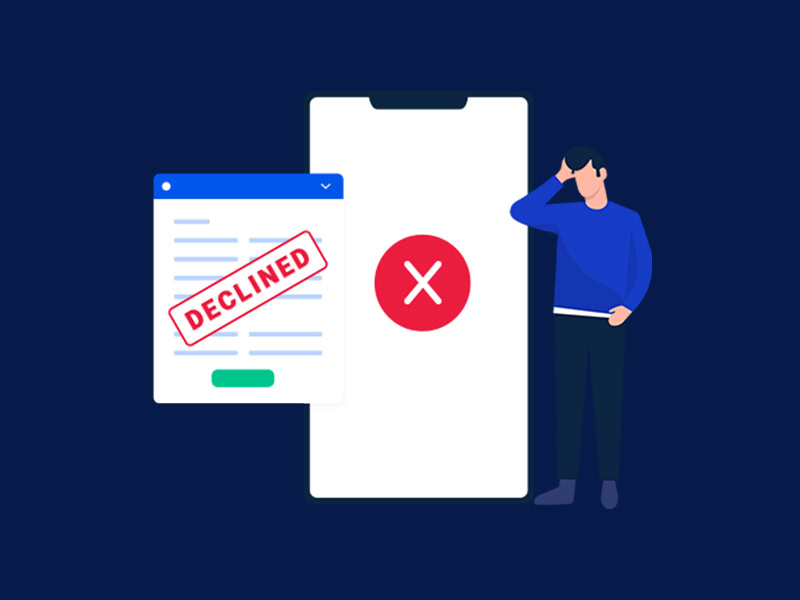Your Payday Loan Was Declined, What To Do Now, Step by Step
EXPLORE A CHEAPER OPTION
If your payday loan application has just been declined, take a deep breath. You are not alone. Every day in the UK, thousands of people apply for payday loans, and many are turned down. This can feel discouraging, especially if you were counting on that money to get by.
But being declined is not a verdict on your character or your future. It’s simply a message from the lender: “Not right now.” There is always a way forward. Let’s break down what this means for you, why it happened, and what you can do to put yourself in a stronger financial position.
What Does a Payday Loan Decline Mean in Plain English?
When a payday loan is declined, it means the lender has reviewed your information, including your income, spending, and credit history, and decided not to lend you money this time. That’s it.
You are not “blacklisted.” You haven’t ruined your chances for all future credit. It’s just a sign that, for this application, something did not meet their criteria.
This is a common experience, and it does not define your financial future. Instead, it’s an opportunity to pause, review, and take action.
The Most Common Reasons for Payday Loan Declines
You might wonder, “Why me?” Most people assume it’s all about a bad credit score, but that’s rarely the full story. Let’s look at the usual reasons for being turned down:
- Incomplete Applications: Many online forms are short and simple. But if you miss key details such as parts of your address history, income, or job information, the lender can’t assess you properly. Even small gaps can trigger an automatic “no.”
- Affordability Concerns: Lenders have a duty to check you can afford repayments without falling into hardship. If your income minus your expenses leaves little left over, they may worry you can’t manage the loan. If your numbers don’t quite add up, or seem rushed, this raises a red flag.
- Duplicate Applications: Sending out the same application to several brokers or websites at once might feel like you’re increasing your chances, but it can do the opposite. Lenders see multiple recent applications and may see this as risky behaviour.
- Errors on Your Credit Report: Old addresses, outdated loans, or mistakes on your credit file can mean you get declined even when you should be eligible. Always check your report.
- Other Eligibility Issues: If you’re under 18, do not have a UK bank account, are not earning enough (usually under £500 a month), or are in very short-term jobs, you may be declined.
None of these reasons are permanent barriers. They are simply things you can address and improve.
TIP: I have seen many people get approved on their next try simply by double-checking every detail in their application, especially their address and job information. Taking five extra minutes here can really make a difference.
What Should You Do Right After a Payday Loan Decline?
Don’t panic. And don’t jump straight into applying somewhere else. Multiple applications in a short time can make things worse, not better. Here’s what you need to do next:
- Read the Decline Notice: By law, the lender must tell you either why you were declined, or which credit agency they used. Look for this information in any email or letter you get.
- Review Your Application: Go back through what you submitted. Were any details missing or incorrect? Did you rush certain sections? Write down any areas where you weren’t 100% accurate.
- Pause Before Reapplying: Repeated applications within days or weeks can harm your credit record. Instead, take a little time to understand what happened.
This is about protecting yourself and building a stronger case for next time.
How to Find Out Exactly Why You Were Declined
You have the right to know why your application was refused. This knowledge can help you fix the problem before trying again. Here’s how to get that information:
- Contact the Lender: Phone or email the company and politely ask for feedback. Ask, “Could you please tell me the reason for my decline, or which information from my credit file led to this decision?”
- Check Your Credit Report: In the UK, you can get your credit report free from Experian, Equifax, or TransUnion. Check it carefully for errors or outdated information.
- Read Your Decline Letter: The lender may mention issues with affordability, credit, or missing application details. Make a note of anything you need to fix.
Knowing the exact reason takes away the guesswork and helps you focus on real solutions.
Does a Declined Payday Loan Hurt Your Credit Score?
This is a very common worry. Let’s clear it up:
- The decline itself is not recorded on your credit file. No one can see it but you.
- What does show up is the application and the type of search the lender did.
- Most payday lenders do a “soft” credit search first. This is invisible to other lenders.
- If they did a “hard” credit search, this is visible and too many in a short time can lower your score.
So, one application and decline won’t ruin your credit. But many in quick succession can. That’s why it’s best to pause and fix the underlying issue before trying again.
TIP: I recommend keeping a personal record of every time you apply for credit. This way, you can avoid making too many applications in a short period, which can protect your credit score.
When and How Should You Reapply for a Payday Loan?
If you feel you still need a payday loan, don’t rush. Here’s what to do:
- Wait At Least 30 Days: This gives you time to address problems, and it makes you look less desperate for credit to future lenders.
- Fix Any Errors: Update your application with the right information. Correct any mistakes you found on your credit report.
- Gather Evidence: Have proof of income, stable employment, and regular bills to hand. This makes you look more reliable.
- Be Honest and Accurate: Make sure every figure and detail on your new application is correct.
- Limit Applications: Only apply to one lender at a time, and only to reputable, FCA-authorised direct lenders.
Taking these steps can increase your chances of a “yes” next time.
Steps to Boost Your Chances Next Time You Apply
Don’t just hope for the best. Prepare. Here’s what you can do:
- Fix Credit Report Errors: Contact the agency and your creditors to dispute and remove mistakes.
- Pay Down Debts: If you have other loans or credit cards, paying them down can help your affordability score.
- Stabilise Your Income: A steady job or regular income goes a long way.
- Budget Carefully: Use free online tools (like MoneyHelper’s Budget Planner) to map your income and expenses. Lenders love to see you’ve done your homework.
- Only Use Trusted Lenders: Avoid brokers who may sell your data and lead to duplicate applications.
Each improvement makes you a more attractive borrower.
Safer Alternatives If You’ve Been Refused a Payday Loan
If you’re turned down for a payday loan, it can feel like you have no options. But you do. Safer, cheaper alternatives exist:
- Credit Unions: Local, not-for-profit lenders who offer small loans with fair terms.
- Guarantor Loans: Someone you trust (family or friend) guarantees your repayments, making approval easier.
- Personal Loans for Bad Credit: Some mainstream lenders have options for people with lower scores. Always check the small print.
- Overdrafts: If you have a UK bank account, a small arranged overdraft can sometimes be cheaper than a payday loan.
- Benefit Advances or Budgeting Loans: If you’re on certain UK benefits, you may be able to get an advance or interest-free loan from the government.
Before borrowing more, weigh the cost and risk of each option.
What If You Don’t Want to Borrow Again? Budgeting and Debt Help
Borrowing more is not always the answer. Sometimes, the best way forward is to seek advice and start to build a plan.
- Free Debt Advice: Organisations like Citizens Advice, StepChange, and National Debtline offer confidential, non-judgmental support.
- Budgeting Tools: Free apps and planners can help you see exactly where your money goes, so you can make changes that last.
- Debt Management Plans: If debt is weighing you down, an adviser can help you set up a plan to repay what you owe at a pace you can afford.
Remember: Asking for help is a strength, not a weakness. You deserve support and understanding.
TIP: I always suggest contacting a free debt advice service if you feel overwhelmed. You will not be judged, and the support can make a real difference in getting your finances back on track.
Protecting Your Financial Health, Avoid Multiple Declines
It’s easy to fall into the trap of applying again and again. But this rarely helps. Here’s how to protect yourself:
- Apply Only to FCA-Authorised Direct Lenders: These are regulated and must treat you fairly.
- Avoid Broker Sites: They often pass your details on, leading to duplicate applications.
- Check Eligibility First: Many lenders now let you do a “soft search” to see if you’re likely to be accepted before you actually apply.
Being careful about where and how you apply protects your credit and your peace of mind.
Your Rights: If You Think Your Decline Was Unfair
You have rights and protections as a UK consumer:
- Payday lenders are regulated by the Financial Conduct Authority (FCA).
- If you feel you were unfairly declined or the lender acted inappropriately, complain to the lender first.
- If you’re not happy with their response, you can take your case to the Financial Ombudsman Service.
- You have the right to know which credit reference agency was used in your application.
Stand up for yourself. You deserve fair treatment and clear answers.
Where This Leaves You and Your Next Steps
Being turned down for a payday loan can feel like a setback, but it’s also a turning point. You’ve got more control than you think. Here’s a checklist to help you move forward with confidence:
Your Post-Decline Action Plan:
- Take a pause, do not rush to apply again.
- Read your decline notice and contact the lender for clear reasons.
- Get your credit report and fix any errors.
- Review your income and outgoings to see what can improve.
- Consider alternatives like credit unions or guarantor loans.
- Seek free, trusted debt advice if you’re struggling.
- Only apply to direct, regulated lenders in the future.
- Look for budgeting and debt solutions before borrowing again.
- Know your rights and how to complain if you’re treated unfairly.
Support Resources for You:
- Citizens Advice
- StepChange Debt Charity
- National Debtline
- Financial Ombudsman Service
- Experian, Equifax, or TransUnion (for credit checks)
- MoneyHelper Budget Planner
Remember, a decline today is not the end of your financial story. Each action you take puts you in a stronger position for next time, whether you borrow again or find a better way to manage your money. I believe in your ability to make positive changes. One step at a time, you can build a brighter financial future.
Kelly Richards is a UK finance writer with over 18 years of experience in personal credit. She founded the Cashfloat blog and now leads content at Payday Loans Online, where she focuses on helping readers make informed, confident borrowing decisions. Kelly holds a finance degree from the London School of Business and Finance.

